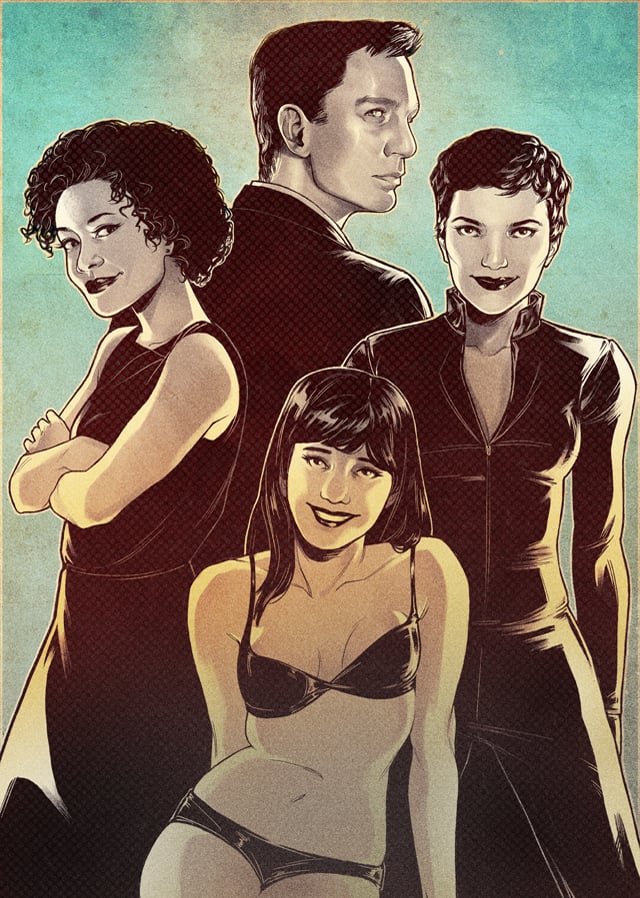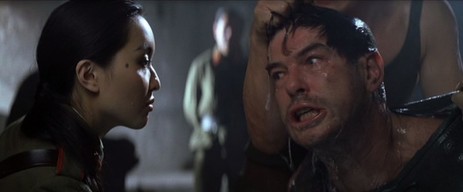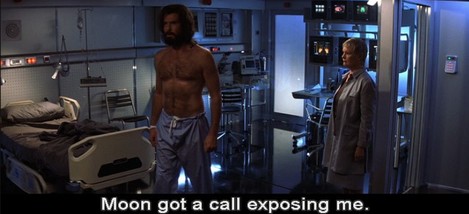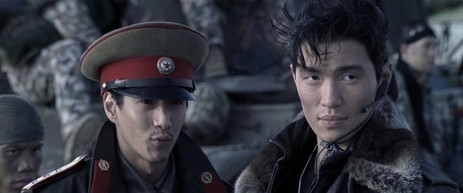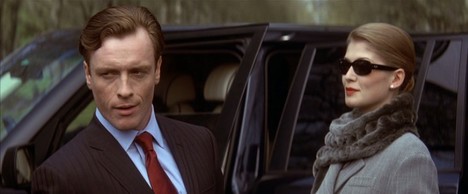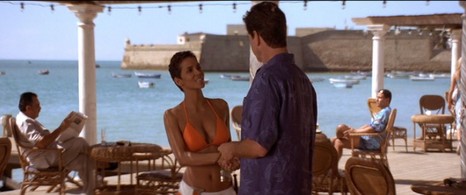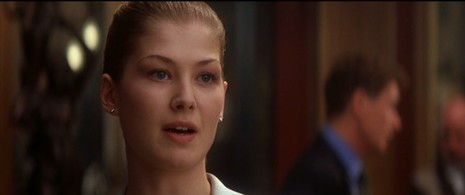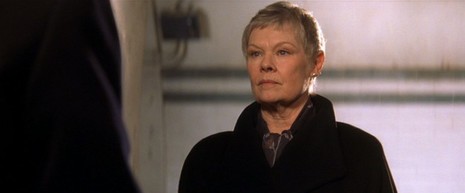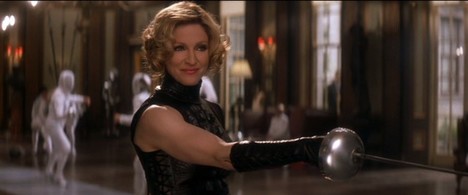Original illustration by Emilie Majarian for The Mary Sue.
Welcome to Bond Girl, a series where we’ll be re-watching and re-evaluating every James Bond film until Spectre’s release.
Contains descriptions of torture and racism related to erasure and weird science.
Die Another Day is … well, it’s not the best Bond movie. It is, in turns, realistic and overdramatic with several scenes that make me shake my head out of disbelief. Despite how much I adore it, I’m also one of the first people to point out how weird the movie was and how they definitely went overboard on the CGI.
Die Another Day is the twentieth James Bond movie in Eon Production’s franchise and Pierce Brosnan’s last time in the role. This movie’s plot focuses largely on the events following James Bond’s capture and subsequent fourteen months of torture at the hands of North Korean General Moon who blames Bond for the death of his son. After being exchanged for another prisoner, Bond comes to the realization that he’s been betrayed by someone supposedly on his side and sets off to take down the person that has betrayed him.
One thing that Die Another Day is good at is the way that it shows the realities of a life of international espionage. For much of the franchise, the violence and risks that James Bond faces can come off as a little cartoonish. Even in some of the films labeled as ‘realistic’, you can’t really feel the risk of his job and his mission. We don’t get that in Die Another Day. In this movie, we see the real results of having your cover blown and being captured in hostile territory.
It’s not pretty.
The violence enacted upon Bond in North Korea is unlike anything we’ve seen in the series so far. There’s no holding back, not suggestion of violence. What we get is the rough and raw story of what happens to Bond and still, what we see isn’t the full experience. Die Another Day is notable for being the second Bond film whose opening credits scene ties in directly to the film’s plot. The torture scene and Bond slowly fracturing underneath the pressure of his experience under torture are all done in the opening credits.
We see Bond stung by scorpions, beaten, isolated, and dehumanized. By the end of the credits, James Bond is a mess. He’s bruised and limping and he doesn’t look a thing like the confident man that we saw in the pre-credits scene. Even when he might be released, Bond looks resigned to a darker fate.
The after effects of being tortured, held as a prisoner of war, and then traded for the enemy take their toll on Bond as well as in his relationships with the people he knows and works with. Treated like he’s dangerous because they can’t read him or what he’ll do next, Bond faces a very unpleasant truth.
To many people, some of those his allies, he’s untrustworthy and a threat because they don’t know what happened to him in North Korea. They don’t know if he’s been brainwashed or manipulated into turning against them. They don’t know if he’s their enemy now.
And they react accordingly.
Bond dealing with that lack of trust and the fact that he’s basically a wanted man to his peers takes up a decent chunk of the film’s first part. The fact that he isn’t trusted by anyone and that he’s unable to trust anyone really messes with his head.
This actually brings us to the politics of being a spy because of course, the person responsible for leading him into this mess is an MI6 agent.
We’re three for four in terms of Bond being betrayed by the people around him, that he trusted. Brosnan’s James Bond obviously kind of sucks at picking out friends and lovers. Out of his run, only one film doesn’t carry a plot line that revolves around someone betraying him and that’s Tomorrow Never Dies.
So in this film, Bond is once again betrayed by someone in his organization, someone that he comes to be close with over the course of the film. Since he doesn’t actually have any proof that he’s been betrayed or that the person works for MI6, that definitely makes him lose a bit of credibility.
Especially with the Americans who blame Bond for the death of one of their North Korean agents that is killed back while Bond was in North Korea. It’s a minor plot note but it’s significant because it shows that the Americans are largely responsible about the attitude towards Bond as well as his retrieval. Had they not thought that he was the person responsible for spilling government secrets, there wouldn’t have been any attempt at rescuing him.
Remember, Bond was resigned to his fate.
Why?
Because it’s protocol for MI6 (and probably other agencies as well). Bond didn’t exist while captured. Not until it’s suspected that Bond is the person spreading highly classified government secrets and he’s therefore causing trouble.
It’s another way that the film manages to incorporate the realities of being a secret agent into a film filled with plenty of nonsensical avenues.
Die Another Day has a very messed up plot when it comes to our main villains. It’s 2002 and the bad guys are North Korean military personnel. Our big big bads are Colonel Moon (played Will Yun Yee) and Zao (Rick Yune). Here’s the thing about that, both men go through incredibly drastic changes during the movie.
Zao winds up disfigured. Thanks to an explosion at the start of the film, he winds up with a literal face full of diamonds.
None of this though, compares to what Colonel Moon does to himself. This is where things get weird. One of the characters that is introduced after the opening credits is British entrepreneur Gustav Graves. Graves is tall and fair-haired. There’s absolutely nothing immediately strange about him. However, he’s on MI6’s radar and, as we come to find out through the film, he’s not who he seems to be.
Graves is actually the alter ego of Colonel Moon. Thanks to a DNA device and clinic from early in the film, North Korean Moon has become this British billionaire. And that’s definitely not okay. When I talk about racism in this series, I know that my annoyance with the franchise’s reliance on villains of color has been a sore point.
But you know what’s even more of a sore point for me?
Erasure.
How do you cast a Korean actor as a Korean character (a character who is vocal about how much he hates British Imperialism at that) and then decide that the logical path for this character is to replace his DNA with mind-bending science in order to become that what he loathes? Lee was Colonel Moon for ten minutes. At the most.
What do we get after that?
A ridiculous science-y plot that explains why Lee is no longer Korean. That’s erasure on a couple of levels and it doesn’t even make sense. Why would Moon, someone who snarks to Bond-as-Van Bierk that he “Majored in Western hypocrisy” while attending school at Oxford and Harvard, decide to become a white guy in his overwhelming plan for world domination?
Did no one stop to think “oh wait, maybe this is a little bit problematic that we disfigure the one Asian villain and turn the other one into a white Brit?”
Apparently not.
What ruins Moon as a character for me is the unintended racism here. He goes from a character that makes a small modicum of sense to a huge mess of a man. Now obviously, he’s such a bad guy. He’s not so against imperialism that he stops himself from trying to expand North Korea’s reach. Look at the way that he talks to Bond:
Colonel Moon: It`s pathetic that you British still believe you have the right to police the world. But you will not live to see the day all Korea is ruled by the North.
But nah – it totally makes sense that he’d choose to have his DNA changed so that he was a white Brit.
Okay.
While it’s a different (and possibly lesser) type of awful when compared to the scene from You Only Live Twice (you know, it’s the one where they put Bond in yellowface and he somehow manages to pass as a Japanese person while in Japan and surrounded by actual Japanese people), it’s still just a weird attempt at throwing a plot twist in our way that I can’t get over that someone greenlit it.
Why?
Why this?
Why not plastic surgery so that Moon’s features were changed just enough to be unrecognizable to spies and facial recognition software? I understand the need to reinvent, to change one’s identity, but why did Moon feel as if he had to go through so much to enact his plans for revenge against the West and South Korea? Why was the role of Gustav Graves necessary for Moon to get the power and funds necessary to put his nefarious plan and Icarus satellite into development?
I liked so much about the weirdness of the plot — because hello, what’s not to love about a giant space laser powered by the sun or Halle Berry kicking everyone’s butt – but at the same time, the fact that huge portions of it hinge on the fact that Colonel Moon gives up his identity rubs me the wrong way.
Thankfully, there are definite bright spots in this film that I wholeheartedly loved and they revolve around the women that Bond becomes close with: Giacinta ‘Jinx’ Johnson and Miranda Frost.
Let’s start with Halle Berry’s Jinx.
Called the first official Black Bond girl (apparently neither May Day nor Gloria Hendry count), Jinx is definitely one of the modern Bond girls as well. She’s got this aggressive but playful personality that works for her. Jinx first appears in a scene that pays a huge nod to the iconic scene in Dr. No where Honey Ryder walks out of the water in her bikini. However, that’s about the only similarity between the two characters. Jinx is confident and self-assured in her skills in a fight as well as in her sexuality.
Sexually confident Bond girls are my favorite. Like Anya from The Spy Who Loved Me and May Day in A View to a Kill, Jinx has very clear ideas about sex. She meets Bond on the beach in Havana and, after a few moments of small talk, we cut to a scene where the two of them are tangled up in one another with Jinx taking the lead for much of it.
And then in the morning when Bond wakes up, he’s alone in his hotel room.
Jinx is totally the “love them and leave them” type and I love it!
I also love that Jinx is definitely a character that can hold her own in a fight. She’s definitely on equal footing with Bond, saving him a few times during the movie and even delivering her fair share of semi-witty banter. Her next major scene after we see her and James Bond rolling around in the hay has her in the middle of a shootout and she’s doing the brunt of the work. She’s a huge badass and I definitely think that she’s on a similar level to Michelle Yeoh’s Wai Lin back in Tomorrow Never Dies in terms of skill level.
A major difference though is that with Wai Lin, she didn’t get her intimate moments with Bond until the end of the film. There was more of a focus on what she could do with her martial arts skills than with how sexy she was. Meanwhile with Jinx, her sexuality is definitely something that she doesn’t shy away from using or embracing.
What I love about Jinx in Die Another Day is that she’s super confident and yet when we do get vulnerability from her (such as when she’s talking to Bond about her track record with relationships or when Zao has her captured), it still fits with the character. She’s well-rounded and interesting and I’m so mad that we never got the Jinx spin off that was tossed about.
Miranda Frost is another fantastic character.
I like her because she’s just as icy as her name implies. Frost is one of those Bond girls that isn’t actually a Bond girl. She’s actually a double agent, working with Moon-as-Graves to undermine MI6 for the sake of North Korea and she’s definitely using her position to do harm.
Frost uses her sexuality as a weapon, distracting Bond at a crucial moment and then emptying the bullets from his gun as he sleeps. She literally disarms him. It’s horrible but awesome!
I have a thing for villainesses that sleep with Bond for their own gain. No one’s telling Frost to sleep with Bond. Not even our bad guy. In fact, M explicitely tells her not to. However, everyone that has known Bond for more than a few minutes knows that women are his weakness. Like Elektra in the previous film, Frost knows that she’s more of a distraction than Zao-as-Graves could ever be because she plays upon his ideas of what women need – he thinks about protection and sees her as weaker than him.
Frost though, is a powerful character. In addition to being a master at emotional manipulation and a skilled double agent, Frost is also a good fighter. Well… up until the point where she’s not good enough. Her last scene in the film takes place on an airplane where she goes up against Jinx in combat. This is easily the best fight scene in the film and we get a chance to see both women fighting and giving it their all.
Of course, Miranda Frost is a bad guy herself and that means that her death comes swiftly and painfully with Jinx stabbing her in the chest with one of her daggers. For what it’s worth, I like her as a character. She actually makes sense. College friend of Zao back at Harvard who decides to work with him in his criminal quest and who may or may not be romantically entangled with him?
I can work with that.
And then of course, there’s M. They’re still softening M up in increments but at the same time, we’re still so very clear that she’s not playing Mommy for any of the agents. Despite the fact that she obviously cares for Bond, she doesn’t let that stop her from doing what she must. It’s a very good quality to have as the director of MI6 and I like that we’re seeing the consequences (both political and emotional) that M faces for doing what she has to in order to keep things cool.
In Die Another Day, we see that M is willing to make a potential enemy out of the CIA for Bond. When the director makes to imply that she let him leave, M shuts him down easily. Coldly. Even though she was all but prepared to leave Bond in North Korea for the good of queen and country, once he’s back in England? She sees him as her responsibility and she obviously doesn’t take well to threats.
Another one of my guilty pleasure Bond movies, Die Another Day is good because it’s not that good.
It’s not a movie that takes itself super seriously all the time (okay, the dialogue is incredibly wooden and Madonna gets a strangely sexy cameo as a fencing instructor on top of her musical contribution). I do like the way that the film does get heavy when it comes to realistic portrayals of what happens to captured spies as well as the film’s entire underlying plot points of trust and identity issues. I also like the fact that even though the CGI is overdone, we do get good use out of it with Bond’s Aston Martin Vanish. It’s officially my favorite car in the series.
This is the one Bond film that I watch while making fun of it the entire time but it’s still one of my go-to films whenever I need to relax and remember why I really like this franchise.
What I’m looking forward to:
I love Daniel Craig as Bond. He’s brutal but sensitive, the kind of Bond that you definitely want at your side. I think Casino Royale is a great film for anyone just getting into the franchise and even though it’s got more fridging than usual, I live to talk about this movie. It reinvents many things about the franchise but at the same time, there’s a lot to it that’s familiar and fun.
We’ve only got three more Bond films left before this series ends the waiting game starts for Spectre and I can’t wait for the waiting to begin! Craig is the James Bond I am the most familiar with because his movies are the easiest for me to sit and marathon (yes, I know Dalton only had two films but I didn’t actually like them that much).
Stitch writes about comics, nerd history, and ridiculous romance novels when not working frantically on her first collection of short stories. Find her on her blog or on Twitter.
—Please make note of The Mary Sue’s general comment policy.—
Do you follow The Mary Sue on Twitter, Facebook, Tumblr, Pinterest, & Google +?



